May 14, 2025 | 15:15 GMT +7
May 14, 2025 | 15:15 GMT +7
Hotline: 0913.378.918
May 14, 2025 | 15:15 GMT +7
Hotline: 0913.378.918
The intensive farming to increase crops, climate change, erratic heat and rain, as well as the risk of pest outbreaks, etc. have significantly affected the productivity and profits of farmers. Farmers use excessive chemical prevention and control solutions to ensure productivity and output. Notably, the habit of periodic spraying and spraying at the beginning of the crop has disrupted the balance of the field ecosystem, greatly damaging human health, adversely affecting the environment and increasing production costs.
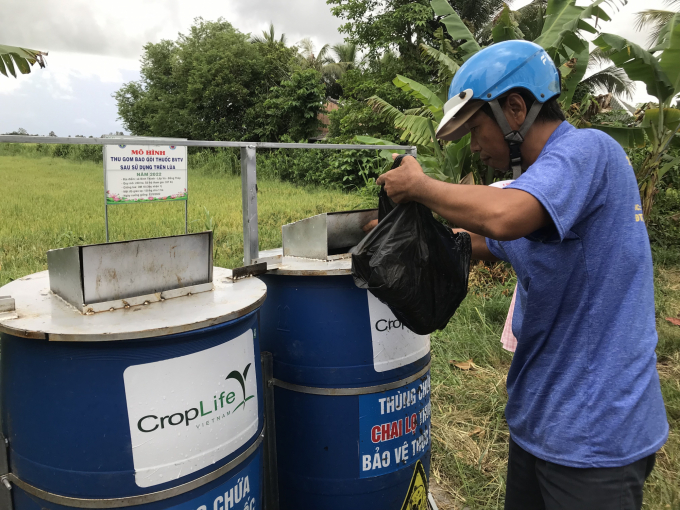
Farmers bringing used pesticide bottles and packaging to the model's container. Photo: Minh Dam.
Every year, a large amount of pesticides is poured into the fields and used pesticide bottles and packages are discarded indiscriminately by farmers or collected and burned at the wrong places, increasing the environmental pollution level. According to the Department of Cultivation and Plant Protection of Dong Thap province, the total amount of fertilizer used in 2020 will be over 350,000 tons with nearly 9,000 tons of pesticides. The total amount of used pesticide bottles and packaging discharged into the environment is 300 tons, and only 2 tons have been collected.
In face of such problem, the Department of Plant Protection, the Department of Agriculture and Rural Development of Dong Thap province in collaboration with the Vietnam CropLife Association signed a cooperation program to use safe and effective pesticides in 2022. Within the framework of the cooperation program, the units have organized training on safe and effective use of pesticides, distributed leaflets, promotional videos; develop and launch a model of collecting used pesticide packaging and bottles on rice and ornamental flower fields; carry out examination and inspection of pesticide production and trading establishments.
Mr. Le Van Chan - Director of the Sub-Department of Cultivation and Plant Protection of Dong Thap province commented on the effectiveness of the model: Through the implementation process, most farmers are aware of the importance of using pesticides sparingly, safely and effectively, as well as collect and deliver used pesticide bottles and packages to the appropriate facilities, contributing to the protection of the agricultural environment. Farmers responded positively in training, collecting used pesticide packaging.
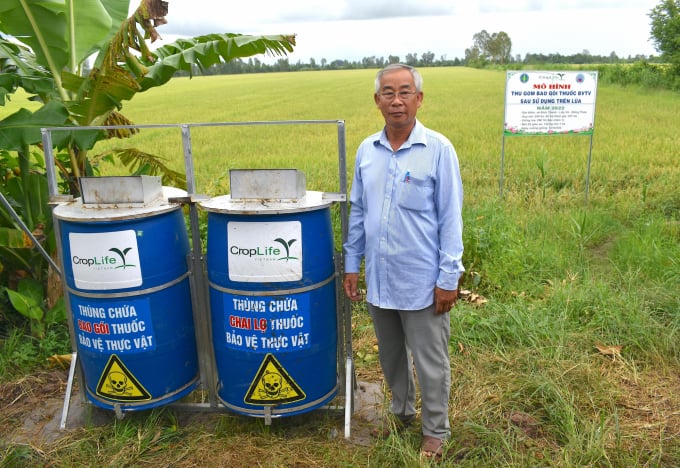
Mr. Cao Tho Truong, Deputy Director of Binh Thanh Agricultural Service Cooperative said that the fields are green and the fields are clean. Photo: Minh Dam.
Binh Thanh Agricultural Service Cooperative in Lap Vo district, Dong Thap province is selected by the pilot program to build a post-use collection model in 2022 with 3 training courses (early, middle and end of the summer-autumn crop), 1 workshop. After the training, farmers organized to collect used pesticide bottles and packaging twice, and the last time they collected nearly 300kg.
Mr. Cao Tho Truong - Deputy Director of Binh Thanh Agricultural Service Cooperative said: "Before the model was deployed, you can walk along the rice fields and spot sights of used pesticide bottles, packaging floating on the channel or scattered at the top of the field. After farmers are trained, they realize the harm, so they voluntarily collected used bottles and put them in the program's containers. Those who cannot afford to deliver to these containers, brought the packaging, bottles and put them in plastic bags outside the field for the collection team. Now the green fields are clean."
Mr. Truong talked about the effectiveness of the training program on the safe and effective use of pesticides: the farmers had significantly saved significantly on production costs, especially on money to buy pesticides.
"The production cost was previously over 2 million VND; this program reduced that amount to 1.7 million VND per worker, saving 500 to 700 thousand VND per worker in the immediate future", Mr. Truong said. He further analyzed that before each pesticide spraying, farmers used many chemicals to treat diseases; they have now learned how to choose the suitable pesticide for the correct disease, avoiding wastee. Additionally, farmers know how to check for pests in the field to decide when and what pesticide to apply. Farmers previously sprayed pesticide following past habits, and on schedule. At the moment, farmers will only spray when there are pests present on the fields.
In addition to Dong Thap province, farmers in the Mekong Delta still follow old practices without reducing seed quantity. The provincial functional departments have established pilot models and promoted many reduction programs including 3G3T, 1P5G, etc. but some farmers are still unable to change their habits; they still use a large amount of seed, resulting in increased costs followed by higher risks of pests and diseases, requiring considerable amount of pesticide. This is a pressing matter to be focused on.
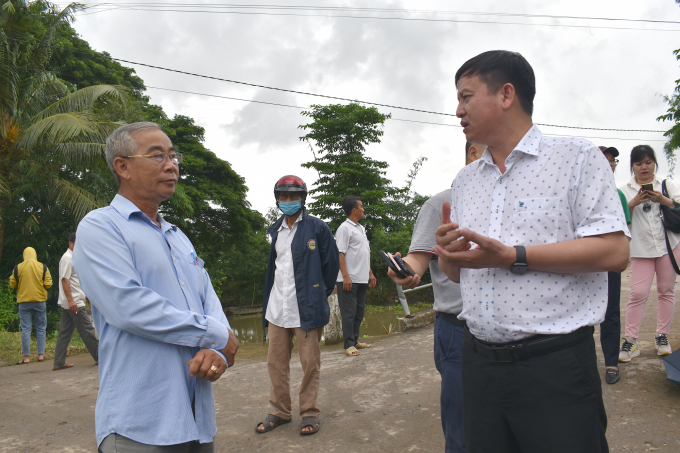
Mr. Huynh Tan Dat, Deputy Director of the Department of Plant Protection discussing with farmers about the practical efficiency of the model of collecting used pesticide bottles and packaging. Photo: Minh Dam.
Mr. Le Quoc Dien, Deputy Director of Dong Thap Department of Agriculture and Rural Development said: “People often have the habit of spraying preventatively, the program helps them to use the appropriate pesticide, at the correct dose, at the correct time, with the correct type of pest. The model helps to solve the problem of environmental sanitation in the fields across the provinces; it also helps keep the environment green and clean, and the quality of life enrichened. This is the model that we will accompany to replicate.”
The majority of farmers currently using pesticides are relying on the advice and guidance of business dealers. Sharing about the effectiveness of the training program on guiding dealers to trade and use pesticides safely, effectively and responsibly, Mr. Tran Van Chuong, owner of Chuong agricultural supply store (Lap Vo district) considered this goal to be "hitting two birds with one stones".
“When I instruct farmers to use pesticides effectively, first of all, as a dealer, I must be responsible and understanding. The training course has a lot of content, which is also very necessary for dealers. There are currently many labels that do not comply with state regulations. I trade in pesticides, sometimes there would be thousands of items so it is not easy to recognize violations. Farmers are more knowledgeable than they were in the past, but to some extent, they still need guidance on how to use pesticide properly”, said Mr. Chuong.
According to Mr. Huynh Tan Dat, the program has helped farmers change their awareness on using pesticides effectively, reducing their damage on human health, ecological environment, bringing value in improving the quality of agricultural products. “The sustainable production process helps farmers save input costs and minimize the impact of the current fluctuating agricultural input prices. We can completely calculate the most effective and economical way to apply pesticide", said Mr. Dat.
Mr. Dang Van Hao, representative of CropLife Vietnam Association, said he was honored to accompany the program. Mr. Hao said that the program is very meaningful in protecting the environment as well as farmers' and future generations' health.
In Vietnam, CropLife and its affiliates are always committed to supporting and implementing long-term strategies to help over 25 million farmers effectively apply scientific solutions in agricultural farming to promote growth, improve crop yields, create high-quality agricultural products while minimizing negative impacts on the environment.
With the aim towards sustainable agricultural development, CropLife Association has been implementing programs to guide and train farmers to use agricultural products effectively, safely and responsibly for the environment and human health, with focus on pesticide products and biotech crop varieties.
Translated by Nguyen Hai Long

(VAN) Data from 10,000 farming households will help professionalize production organization and support the implementation of the One Million Hectares Program for High-Quality, Low-Emission Rice Cultivation.

(VAN) FAO Director-General QU Dongyu marks International Day of Plant Health at NENA conference.

(VAN) Deputy Minister of Agriculture and Environment Hoang Trung affirmed that floriculture and ornamental plants are a growing industry that receives significant global attention.

(VAN) The three staple crops dominating modern diets – corn, rice and wheat – are familiar to Americans. However, fourth place is held by a dark horse: cassava.
/2025/05/10/4037-3-223011_495.jpg)
(VAN) Remote sensing technology is becoming an indispensable tool in monitoring resources, developing modern agriculture, and protecting the environment in Vietnam.
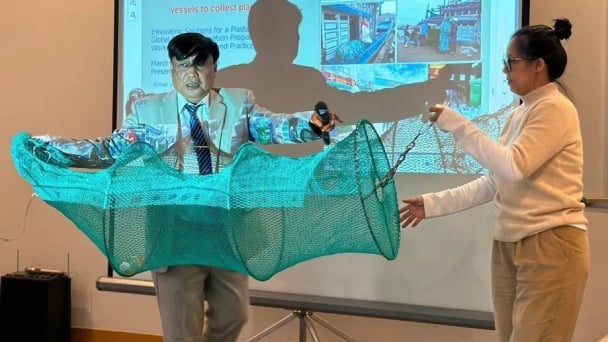
(VAN) The trash bag used on fishing vessels can withstand rough sea conditions, including level 8 to level 10 winds and waves. Notably, it can be hung anywhere on the boat.
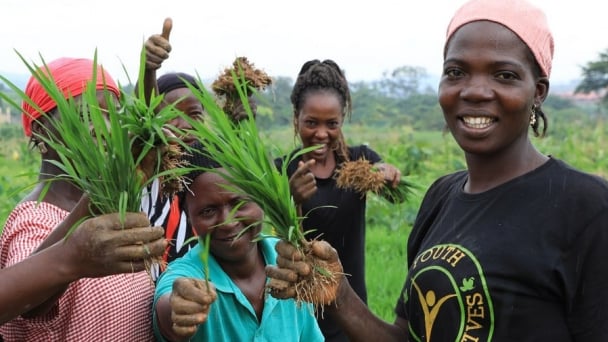
(VAN) African leaders launched the Kampala Declaration on Building Resilient and Sustainable Agrifood Systems in Africa, marking a bold step toward transforming the continent's agriculture.